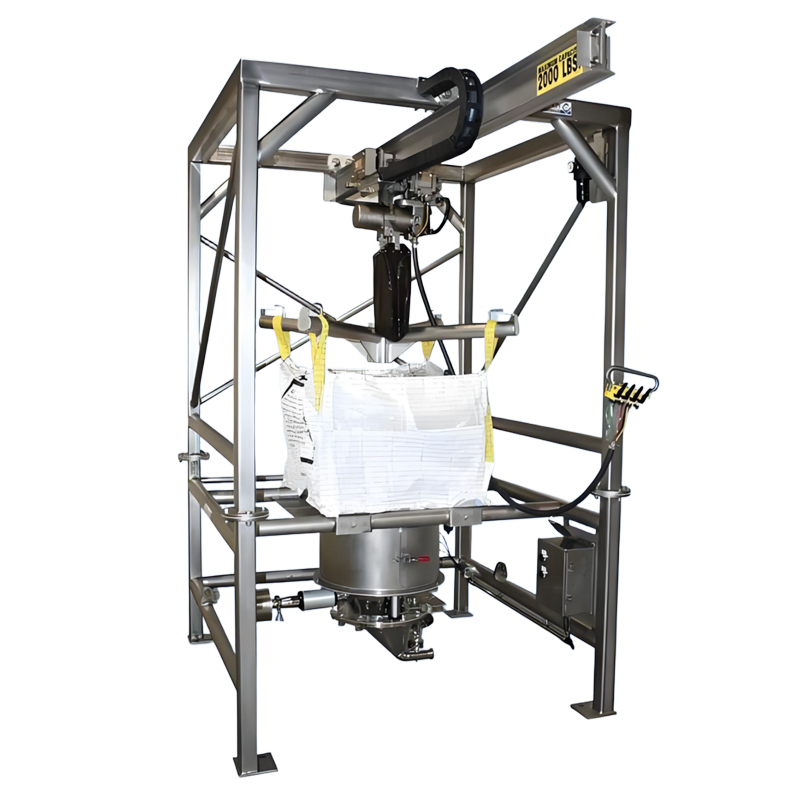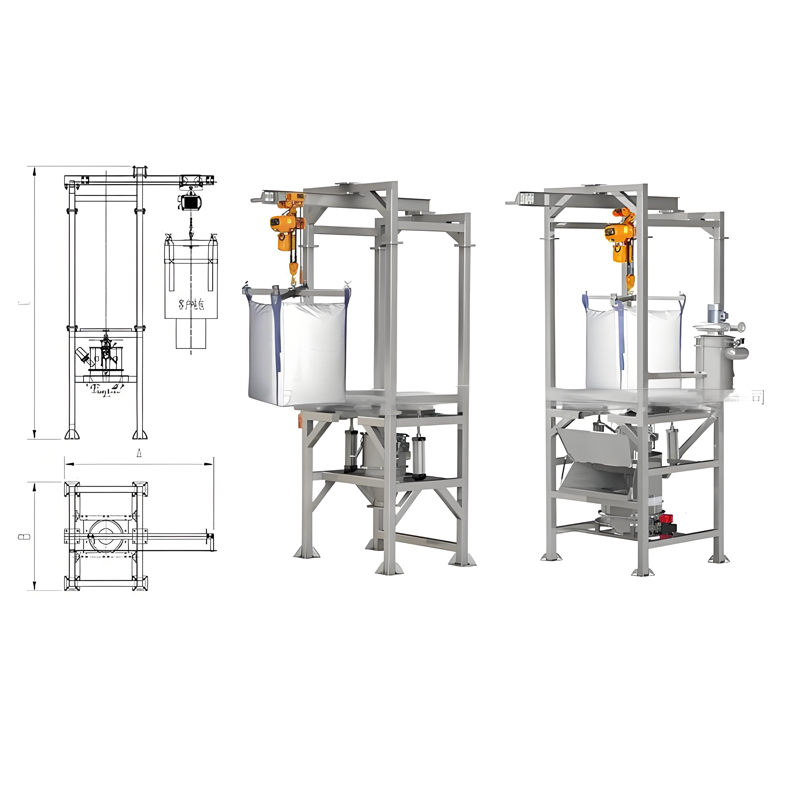Products Description
Brief Introduction
A Big Bag Unloading Station is an automated system designed for the safe, efficient, and dust-free unloading of powdered and granular materials from Flexible Intermediate Bulk Containers (FIBCs), commonly known as big bags or ton bags. It mechanically lifts and secures the big bag, then employs controlled methods to open the bag spout, allowing material to discharge smoothly via gravity or with assistance into downstream conveying systems or process equipment within a sealed environment.
This equipment effectively addresses the problems associated with manual unpacking—such as low efficiency, high labor intensity, significant dust pollution, and safety risks—making it a crucial component for automating and cleaning powder charging processes.
Features
1. Superior Occupational Health and Safety
Complete Dust Control: The entire unpacking and discharging process occurs within an enclosed space, integrated with an efficient dust collection system, suppressing dust escape at the source. This protects operator respiratory health and prevents dust explosion risks.
Significantly Reduces Labor Intensity and Injury Risk: Automated mechanical lifting, positioning, and discharging eliminate the musculoskeletal injuries and cuts associated with manual bag cutting, handling, and pouring, achieving "man-material separation."
2. Significant Production Efficiency and Economic Benefits
Efficient Continuous Operation: The equipment has high processing capacity and fast unpacking speeds, enabling continuous feeding. This greatly reduces material preparation time and boosts overall production efficiency.
Near-Zero Material Residue: Assisted by devices like bag patters and vibrators, it ensures the big bag is almost completely emptied, resulting in very low material loss rates and reduced production costs.
Reduced Reliance on Labor: Single-person or unmanned operation modes significantly decrease dependence on skilled workers and associated labor costs.
3. Unmatched Environmental Protection and Clean Production
Meets Stringent Environmental Regulations: The fully enclosed design prevents dust leakage, effectively protecting the work area and plant environment, and easily complies with standards like OSHA and EPA.
Prevents Cross-Contamination: The sealed system effectively isolates materials from external contaminants. For industries with high hygiene standards like food and pharmaceuticals, it is key to ensuring product purity.
4. Excellent Flexibility and Reliability
Wide Material Compatibility: By adjusting parameters like outlet size and vibration frequency, it can handle various materials from super-fine powders to small lumps, effectively addressing issues like bridging and clogging.
Quick Bag Changeover and Cleaning: User-friendly design simplifies big bag attachment; the smooth interior allows for easy cleaning, facilitating rapid changeover between different material batches.
5. Intelligent Control and System Integration
Automation Integration: Can be interconnected with equipment like big bag lifters, conveyors, weighing scales, and dust collection systems, enabling full automation from the warehouse to the charging point.
Simple and Intuitive Operation: Features PLC control, a user-friendly HMI (Human-Machine Interface), flexible parameter settings, real-time status monitoring, and fault self-diagnostics for easy maintenance.
Application Scenarios
The Big Bag Unloading Station is the ideal choice for achieving automated charging in industries that handle bulk powders and granules:
Plastics and Rubber Industry: PE, PP, PVC plastic pellets, carbon black, etc.
Food Industry: Flour, sugar, starch, milk powder, food additives, etc.
Chemical Industry: Pigments, dyes, resin powders, fertilizers, minerals, etc.
Pharmaceutical Industry: Active Pharmaceutical Ingredients (APIs), excipients, etc. (Requires GMP compliance).
Building Materials Industry: Cement, fly ash, dry mortar, etc.







